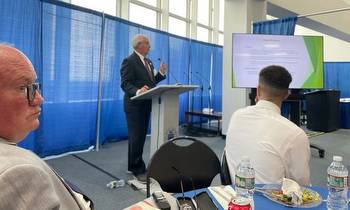AG Platkin, Division of Gaming Enforcement Announce Two New Tools to Help Problem Gamblers
ATLANTIC CITY — With the NBA and NHL finals in full swing— and fans betting on everything from which team will win, by how much, and how many points individual players will rack up — Attorney General Matthew J. Platkin and Division of Gaming Enforcement (DGE) Director David Rebuck today announced two new tools to assist problem gamblers: a dedicated hotline and a virtual option to self-exclude from gaming activities.
Gamblers seeking to exclude themselves from wagering in New Jersey can now contact DGE via a new, dedicated, toll-free phone number, 1-833-788-4DGE, to learn about and initiate the self-exclusion process. Patrons can utilize that helpline to set up an in-person appointment with specially trained DGE staff or to take advantage of a new service, a video conference with DGE responsible gaming personnel.
Through traditional in-person or newly available virtual meetings, patrons can choose to exclude themselves from online gambling or from both online and in-person gambling. The new video-conference option reduces barriers for patrons to address their problem gambling by completing the process without leaving their homes.
Patrons can also exclude themselves from Internet gaming through an online application and via the DGE website, after identity verification has been completed. A meeting is required for self-exclusion from brick-and-mortar casino gambling.
“New Jersey has always been a national leader in gaming, as the first to allow casino gambling outside Nevada and the first to launch Internet gaming. And we are now focusing on making our pioneering state the standard in responsible gaming practices,” said Attorney General Platkin. “The efforts announced today underscore our commitment to helping problem gamblers by expanding the entry points for self-exclusion and other methods to receive assistance.”
“We hope the new tools being unveiled today will help to further reduce the risk of problem gambling,” saidDavid Rebuck, Division of Gaming Enforcement Director. “By promoting responsible gaming practices, we can help keep gaming an enjoyable and entertaining activity for all.”
DGE is also preparing to launch an updated Responsible Gaming landing page on its website that will serve as a central location containing a variety of responsible gaming information, including:
- Self-exclusion information;
- Annual reports by Rutgers University which examine the impact of Internet gaming and sports wagering and analyze patterns of play across all players and bets during the year;
- DGE’s responsible gaming best practices for operators; and
- DGE’s responsible gaming regulations.
Today’s announcements follow the appointment in early May of DGE’s first Responsible Gaming Coordinator, Deputy Attorney General Jamie McKelvey.
A graduate of Rutgers Law School in 2013, McKelvey completed a clerkship with state Superior Court Judge Patricia Wilde — a former DGE Deputy Attorney General and former casino lead counsel. McKelvey then worked for the Atlantic County Prosecutor’s Office and the New Jersey Division of Criminal Justice before joining DGE, where she has been a Deputy Attorney General for over four years.
As DGE’s first Responsible Gaming Coordinator, she is responsible for the development, oversight, and implementation of DGE’s existing responsible gaming programs as well as future initiatives. She will be engaged with DGE licensees to ensure their ongoing commitment to the state’s responsible gaming goals, and she will collaborate with other state, national, and international government agencies engaged in research or the operation of programs designed to prevent and treat problem gaming behavior. McKelvey will also collaborate with problem-gambling organizations to identify best practices for the prevention, education, awareness and outreach to those at risk.
Today’s new initiatives also follow Attorney General Platkin’s announcement during an April 20 address to regulators and industry representatives at the East Coast Gaming Congress. The Attorney General announced several new initiatives to combat problem gambling and address the explosion of gaming advertising — including new advertising standards for operators that limit ads in locations where they could entice those under 21 years of age to play and that provide the public with the ability to swiftly opt out of direct advertising.
These efforts continue those announced in early 2023, when Attorney General Platkin and DGE introduced the Responsible Gaming Initiative to monitor player behavior for red flags indicative of a gambling disorder. Player data already captured by operators is now being used to uncover potential problem gambling patterns, such as an individual’s gambling time increasing from week to week or a player wagering until they have less than one dollar in their accounts.
Gamblers exhibiting warning signs are now approached using various circumstance-dependent interventions, including progressive responses if the indications of a potential disorder keep recurring after attempts are made to assist. At level one, a patron receives automated outreach regarding responsible gaming resources. If the warning signals continue, the patron is shown a video tutorial explaining responsible gaming and available resources before being allowed to continue gambling. At the third level, the operator’s responsible gaming lead or team will directly contact and address the issue with the patron.































